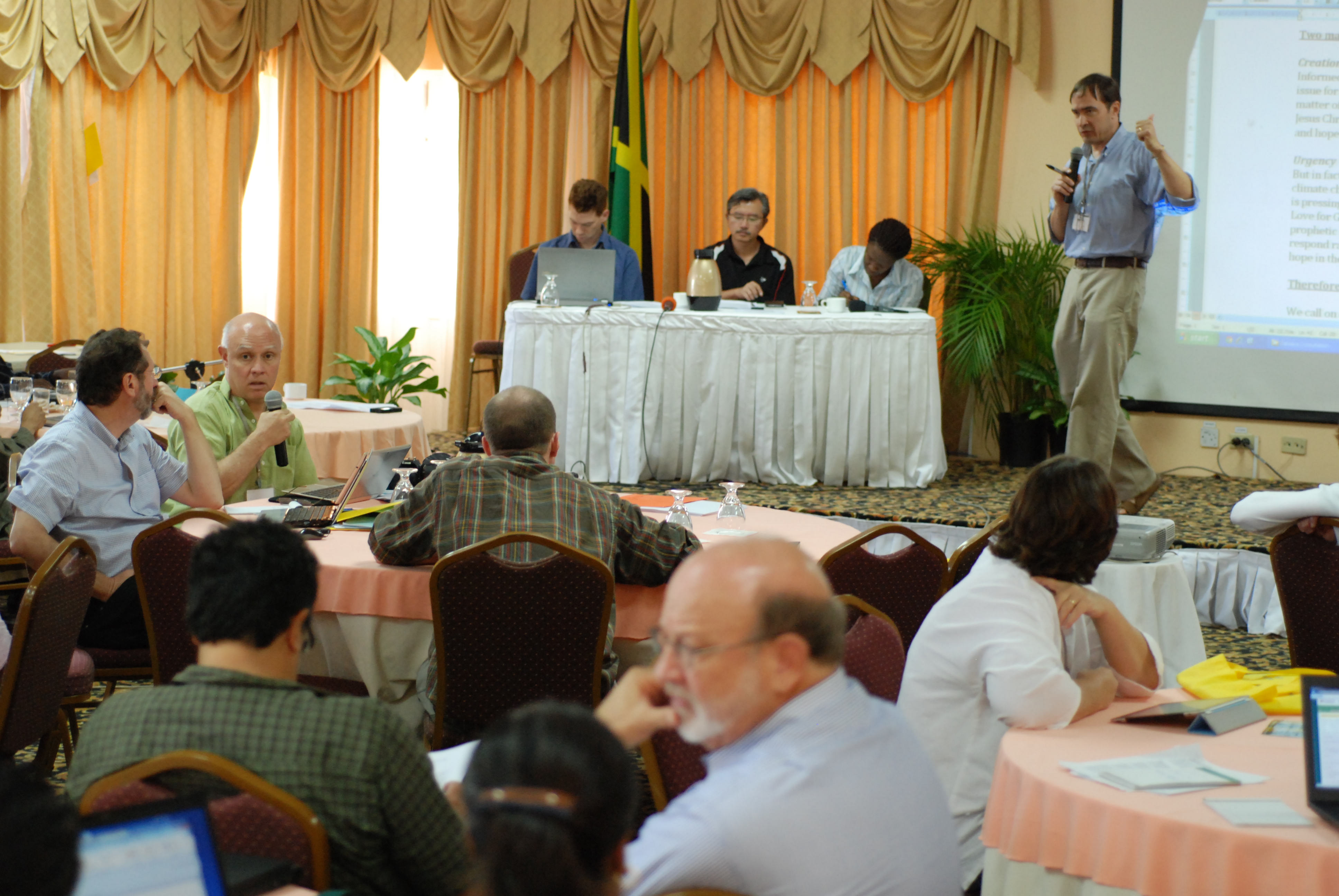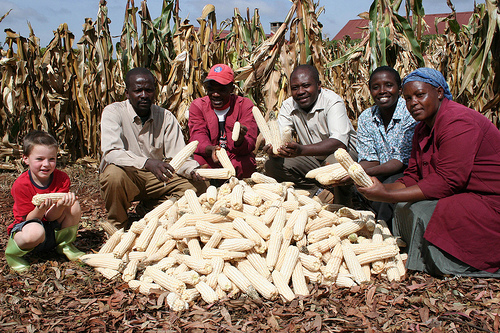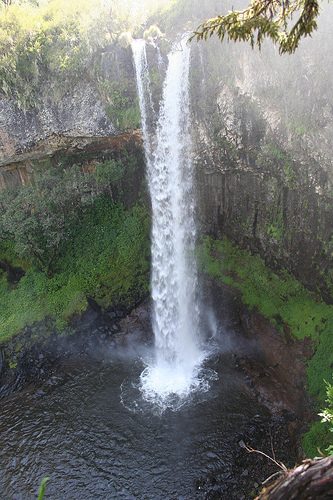
Note from the Editor: The second post in a four part series on Creation Care & the Lausanne Movement by Ed Brown, Director/CEO of Care of Creation and the Senior Associate for Creation Care for the Lausanne Movement. A New Awakening? Creation Care & the Lausanne Movement is the first post in the series. ~ Thomas B. Grosh IV, Associate Director of ESN.
——————
About 55 people from 40 countries gathered in Jamaica on Oct 29, 2012 for five days of meetings around the subject of Creation Care and the Gospel under the auspices of the Lausanne Movement in collaboration with the World Evangelical Alliance. The meeting was organized around three themes:
- God’s World (scientific examination of the nature of the environmental crisis)
- God’s Word (theological perspectives on creation and our responsibilities as seen in the Bible)
- God’s Work (how we are, can and should be responding to these needs in partnership with God).

By remarkable and symbolic coincidence, the Consultation went into session during the same hour that Hurricane Sandy made landfall just south of New York City, having already devastated portions of the Caribbean. A number of participants were delayed or were unable to attend at all because of the associated travel disruptions, and the storm provided an important, if unwanted, reminder of the urgency of our deliberations.
It was a valuable gathering and would have been worthwhile just for the five days we spent together. [Some of the content from the Consultation is available here with video of the main talks to be posted soon; a book is expected within the next year or so.] However, one of our early goals was to produce something that would serve as an immediate guide and point of focus for the evangelical community with regard to creation care. The resulting document is the Jamaica Call to Action.
This is not the first, nor will it be the last creation care call to action. It is, however, unique in two or three respects: The articulation of two brief but comprehensive “convictions” on which it is based; the comprehensiveness and specificity of the calls themselves; and the eloquent and passionate call to prayer with which it closes.
First, the two convictions. What may be one of the greatest contributions this document makes to the current evangelical discussion is its brief distillation of what are, on reflection, if not the only reasons on which Christians can base a response to today’s environmental crisis, certainly the best.

The first is an affirmation of the Cape Town Commitment’s assertion that creation care is central to the gospel:
Creation Care is indeed a “gospel issue within the lordship of Christ” (CTC I.7.A). Informed and inspired by our study of the scripture – the original intent, plan, and command to care for creation, the resurrection narratives and the profound truth that in Christ all things have been reconciled to God – we reaffirm that creation care is an issue that must be included in our response to the gospel, proclaiming and acting upon the good news of what God has done and will complete for the salvation of the world. This is not only biblically justified, but an integral part of our mission and an expression of our worship to God for his wonderful plan of redemption through Jesus Christ. Therefore, our ministry of reconciliation is a matter of great joy and hope and we would care for creation even if it were not in crisis.
The key points to note in this paragraph:
- Our care of God’s creation rises out of the study of scripture. It is profoundly and comprehensively biblical, and is not just based on Genesis 1 & Genesis 2, but also the accounts of Jesus’ resurrection and Paul’s key assertion in Colossians 1 that in Christ God is reconciling ‘all things’ to himself.
- Creation care is not the gospel, but is rather an issue to be included ‘in our response to the gospel.’ The gospel is something God has done for us; creation care is part of how we respond to that act of salvation and reconciliation. The two are inextricably linked but are not identical.
- Finally, our response is positive, joyful and worshipful. ‘We would care for creation even if it were not in crisis.’ This is an important reminder that the fundamental Christian response to environmental challenges is not driven by negative motives. We should act, and we will act, not out of fear, not out of guilt but out of love for God and the world he has given us.
The second conviction follows logically from that last sentence – there is, in fact, a crisis:
We are faced with a crisis that is pressing, urgent, and that must be resolved in our generation. Many of the world’s poorest people, ecosystems, and species of flora and fauna are being devastated by violence against the environment in multiple ways, of which global climate change, deforestation, biodiversity loss, water stress, and pollution are but a part. We can no longer afford complacency and endless debate. Love for God, our neighbors and the wider creation, as well as our passion for justice, compel us to “urgent and prophetic ecological responsibility” (CTC I.7.A).

Again, the key points:
- The crisis has a deadline – it ‘must be resolved in our generation.’ This is more than rhetoric; it is a direct response to the nature of the scientific material the consultation reviewed, an acknowledgement that some of the changes we humans are causing in creation, if not reversed soon, will lead to catastrophic and possibly permanent changes in the ecological regimes that govern the planet.
- The crisis is multi-dimensional. It is important to note that this is not a call to action for climate change, though it includes that, but rather it is a call to look holistically at God’s creation in its entirety.
- The time for debate is over. Even though all is not yet known about the challenges, we know enough to begin, and we are compelled toward, in the words of the Cape Town Commitment, ‘urgent and prophetic responsibility.’
These two convictions are followed by 10 specific “calls” – specific challenges to scholars in particular in almost every field that I think go beyond any other recent Call to Action document. In the third post of the series, we summarize and briefly comment on each of these. For this material click here.
Rev. Edward R. Brown (Ed) is the Director and CEO of Care of Creation, and has recently been named the Lausanne Senior Associate for Creation Care for the Lausanne Movement. He directs the work of Care of Creation in the US, Kenya and Tanzania, and as Lausanne Senior Associate is responsible for all of the Lausanne Movement’s creation care activities. He speaks throughout the US and internationally on the topic of Creation Care, and has been a seminar presenter at four previous Urbanas.
Ed is the author of two books: Our Father’s World: Mobilizing the Church to Care for Creation, published by InterVarsity Press in 2008, and When Heaven and Nature Sing: Exploring God’s Goals for His People and His World, just released by Doorlight Publications in December, 2012. Our Father’s World was praised by biologist and environmentalist E. O. Wilson as “beautiful and inspiring, †and author Howard Snyder says When Heaven and Nature Sing “is packed full of wisdom—wisdom that is both biblically based and ecologically sound.â€
Ed received the Bachelor of Arts degree from Gordon College and the Master of Divinity from Gordon Conwell Seminary (Pastoral Studies). He served as Chief Operating Officer for Au Sable Institute of Environmental Studies, and has worked with InterVarsity Christian Fellowship and as a pastor both in the US and overseas. He and Susanna, his wife, both grew up as children of missionaries in the country of Pakistan, and carry a love for that country and for overseas ministry with them. They live in Madison WI and have four grown children: Melanie, Tim, Katrina and Amy.
Organizational background: Care of Creation Inc. is an environmental missions organization. It was founded in 2005, “to pursue a God-centered response to environmental challenges that brings glory to the Creator, advances the cause of Christ, and leads to a transformation of the people and the land that sustains them.â€
Care of Creation seeks to “mobilize the church†in various countries to focus on creation-care as an important part of ministry. Overseas projects include education, tree-planting and agricultural programs. The organization currently has projects on the ground in Kenya and Tanzania and plans to expand to other countries in East Africa in the near future.

Leave a Reply